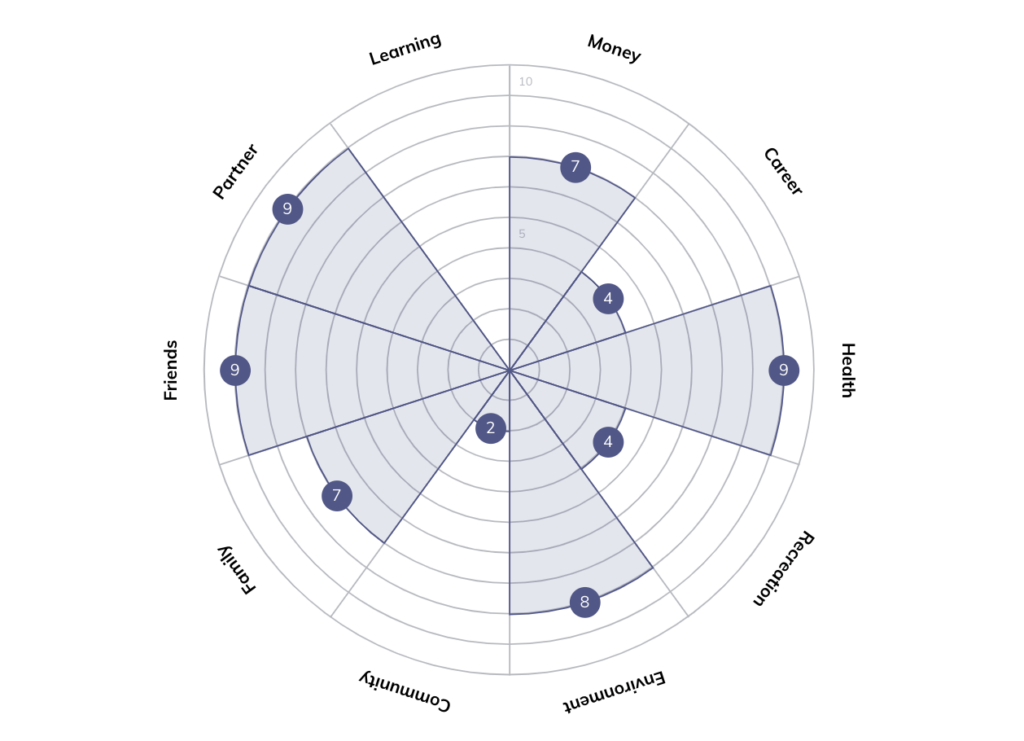Getting caught in the daily challenges that life throws at us can create instances of self-doubt and insecurities for an individual, diverting them from their goals – both personal and professional. In such situations, receiving guidance from a trained professional can make all the difference in order to forge the path for a positive, successful future.
Life coaching is basically a result-focused partnership built on the basis of strong trust & understanding between a life coach and a client. The life coaching process itself is designed to help clients self-improve, tap into their hidden potential, enabling them to become better versions of themselves.
So, what to expect from a life coach? A life coach can help their client best once they understand their motivations and obstacles, which then helps to create a roadmap to make that journey from aspiration to achievement.
But how can a life coach pack all this in a single coaching session? Sounds a bit daunting, but having a systematic life coaching structure in place makes the job much easier, no matter if it is an experienced life coach or a newbie who’s just starting out. Read on to know how having an established life coaching session structure can help clients attain their goals and leave a definite impact.
Determine the objective of the life coaching session
Before rushing in to map out a life coaching session structure, it is necessary to determine the exact purpose of the life coaching session. Understand what the client is expecting from a session – are they committed to only a single session for guidance towards achieving a particular goal or are they looking for a multiple-session engagement that can deliver a long-term change in their lives.
Once the core objective of the life coaching session is established, the next logical step is to design the session considering the desired outcome.
How to structure an impactful life coaching session
Although the basic concepts of coaching apply, life coaching is not a one-size-fits-all kind of process (there are different types of life coaches that specialize in particular niches such as career coaching, health coaching, relationship coaching, business coaching and more); it is customized to suit individual needs.
The intention of life coaching is to help individuals gain more insights into their core strengths & shortcomings, develop newer competencies, venture beyond their comfort zone, think outside the box, get better clarity on achievable goals, improve social interactions & personal relations, accept mistakes and find ways to correct them, and more.
A life coach will be a trusted friend who will collaborate with the client to provide support & guidance while encouraging self-awareness, so that the client themselves can overcome their limitations and excel in all areas of their lives to achieve quantifiable results.
Keeping these objectives in mind here’s how a life coach can structure an impactful life coaching session:
1. Create a distraction-free environment
A calm, safe, and positive environment is vital for a meaningful dialogue between a life coach and their client. Any interruptions such as loud noises, visual distractions, uncomfortable locations, etc. can interfere with smooth communication.
The body language, confidence, oratory skills of a life coach also make a difference, so it is necessary that the coach is presentable, exudes positivity & warmth and makes the client feel comfortable at the outset. For all of this, having the right ambience is crucial.
2. Emphasize on privacy & confidentiality at the outset
Just as the relationship between a therapist and patient is sacrosanct, same holds true for the relationship between a life coach and their client. Trust is the very foundation on which a successful coach-coachee relationship rests.
It is imperative for the life coach to assure their client that all disclosures, be they personal or professional, will be dealt with in the strictest of confidence. Only when the client is convinced that their private details are safe with the coach will they truly open up about their ideas, challenges & goals.
3. Build rapport
One of the main points of the life coaching session is to build a precise, clear, strong & trustful communication channel between the coach and client, especially if it is a first session. An open exchange is essential even with an existing client and one of the best ways to do that is to encourage the client to speak and share openly.
A life coach can foster communication by asking simple but meaningful questions to the client.
Example of questions you can ask: “How was your day?”, “Any highlights that you want to share?”, “What are you looking to achieve?”, “Any specific area that you want us to work on?”, “What are you hoping to gain out of this session?”
These straightforward queries can set the tone for the entire session and clue the coach on how to proceed, what modifications to the coaching process will be required, what would motivate the particular client, what topics to avoid, and more.
Generally, a life coaching session lasts anywhere between 45-60 minutes and is conducted weekly or bi-weekly. The initial sessions are essentially for understanding the client, their ideas, obstacles, their future aspirations. And for all of this, building rapport is crucial.

Asking insightful life coaching questions is an art…
…an art that you can learn easily with the help of our guide!
4. Identify challenges & priorities
Now that the life coach has a fair grasp on what their client is hoping to gain out of the sessions, it is vital to identify the topmost priorities. The client could have a number of trouble areas they wish to address, but focusing on one or two most important ones to start with is always a good idea.

A life coach has multiple tools and smart techniques at their disposal to assess the client’s priorities. By asking the client to fill out the Wheel of Life or 360-degree assessment forms can provide comprehensive feedback about their strengths, weaknesses, purposes and goals.
It gives a clear picture on where they are and what they hope to achieve and can help the life coach draw out a personalized plan of action for them.
Want to get deep insights into your coachees’ strengths & environmental triggers?
Take the ‘360 Feedback – Qualitative’ tool for a spin.
Try the Tool Now
5. Address the current reality
Now that the challenges & priorities have been identified, it is important to gain perspective on where the client is currently in relation to their priorities. The very reason why a client prefers to employ the services of a life coach is to support/guide them in addressing their present situations to enable a better tomorrow.
Asking pertinent questions such as, “What does success look like in your eyes?”, “What will happen if you decided to change the situation?” can enable the life coach to set the agenda for a session. Addressing issues one (or two) at a time in the course of a session means uncomplicated focus on the present issue and higher chances of solving that problem.
Encouraging the client to look at the same problem but from a different angle is one of the significant changes that a life coach can help the client with. This changed perspective can either provide new insights towards a solution or make the client understand that maybe the issue that they were worried about was not an issue at all.
It is not reasonable neither possible to believe that all problems will get solved in a single or even a few sessions, so management of expectations versus achievable results is vital.
6. Establish an action plan
Bridging the gap between existing reality and desired outcomes is the main objective of signing up for life coaching sessions. This is where the expertise of a life coach comes into place, where after careful analysis of strengths, weakness, challenges & objectives of the client, the life coach assesses where the client is now and how to get them to where they want to be.
This means establishing an action plan, in collaboration with the client, which can be implemented in following sessions. Equipped with a feasible roadmap, the life coach facilitates the client on a journey of self-discovery to take small steps to explore their hidden strengths, understand their true potential, look at their problem areas from a different viewpoint, etc., all guiding them towards their true purpose of becoming better versions of themselves.
7. Set accountability
The best of plans won’t work if all the stakeholders are not equally committed to its success. Just as it is the life coach’s responsibility to inspire, support and guide the client towards achieving their goals, it is equally the client’s duty to take charge of implementing the various changes that have been agreed upon.
The life coach must hold the client accountable for the outcomes of a coaching session; after all it is their life journey and they themselves have to lead it. Without equally dedicated input there cannot be a positive output.
Of course, setting accountability may not happen in the first session itself, as the coach and client are still unfamiliar with each other. But during successive sessions, after a comfortable rapport has been built, the life coach can and must follow through on accountability by asking the client to complete certain tasks (homework, if you will) before the next session.
They can ask questions such as: “How was your experience of working on the action steps we decided on?”, “What would you do differently going forward?”, “Did you learn anything new about yourself during the assignment?”.
The people who really benefit from the life coaching process, as opposed to when they try to solve their problems by themselves, are those who stay committed to the actions, take responsibility for their life changes, and most importantly, follow through on the tasks that their life coach suggests during sessions.
Life coaching is a two-way, highly personalized street with collaboration & trust being the essential factors. A solid bond between the coach and client is vital to empower the client to act independently and self-realize their goals. It may not be possible to map out a life coaching session plan to the smallest details, but the broad objectives that have been established can be followed to ensure that the life coach session structure journeys towards the final goals that a client wants to attain.
FAQs
1. How many sessions does a life coach need with a client?
Life coaching is a highly personalized field and people seek out the services of a life coach for varied reasons including personal, professional, health etc., to become more productive, lead a more fulfilling & value-added life, and most importantly, to attain their unfulfilled goals.
So, the number of sessions an individual depends on whether they are looking at short term or long-term goals. For short term goals (losing weight in a set time frame, giving up certain undesirable habits, etc.) having one or two sessions per week with the life coach is preferable. If the person is looking at a 2-month timeframe for completing their target, then around 10-12 life coaching sessions would be needed.
For long term goals (critical career changes, repairing personal relations, etc.) life coaching sessions should be more frequent in the initial stage as they look to build a comfortable rapport with the life coach and then can become less frequent as they try and implement the action plan suggested by the coach. Anywhere between 15-20 sessions would be preferable.
About Simply.Coach
Simply.Coach is an enterprise-grade coaching software designed to be used by individual coaches and coaching businesses. Trusted by ICF-accredited and EMCC-credentialed coaches worldwide, Simply.Coach is on a mission to elevate the experience and process of coaching with technology-led tools and solutions.
Read more :
Top Life Coaching Tools You Need
How to Start a Life Coaching Business: The Ultimate Guide
Life Coaching Resources to Help Coaches Grow Their Skills & Practice
What is Life Coaching & How Does It Work?
What Problems Does a Life Coach Help Solve?
The Ultimate Guide to Group Life Coaching
Life Coaching Techniques & Skills Every Coach Should Know
Understanding the Difference Between a Health and Life Coach

Writer
An avid reader with love for books on history, sci-fi and popular fiction, Pallavi is a gifted content writer. She is also a keen listener of Indian semi & classical music. Currently, she juggles her duties of being a full-time mom with part-time content writing.








